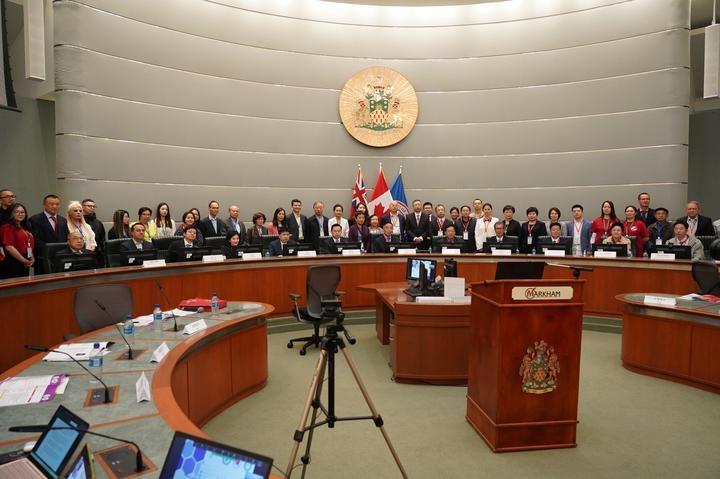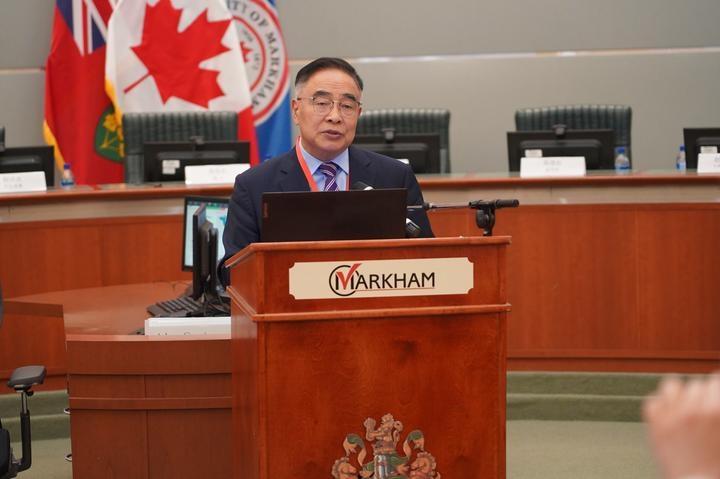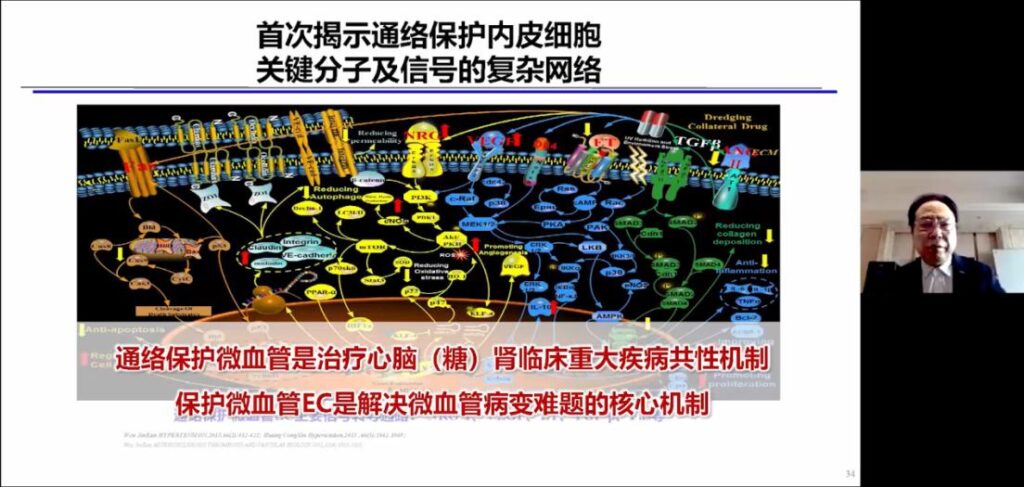The “World Forum on High-Quality Development of Chinese Medicine Education” & “10th Canada Acupuncture and TCM Continuing Education Conference” commenced on August 27 in Toronto, Canada. The event witnessed the presence of Deputy Mayor Guozhi Chen of Markham City, Deputy Consul General Hongbo Cheng, Science and Technology Counselors Hao Peng and Ying Feng from the Consulate General of China in Toronto, and Boli Zhang (Academician from the Chinese Academy of Engineering and Honorary President of Tianjin University of Traditional Chinese Medicine), as well as several presidents from Chinese universities specializing in traditional Chinese medicine (TCM) and renowned international experts in the field. Prof. Yiling Wu, Academician of the Chinese Academy of Engineering, and pioneer and leading figure in the field of “Collateral Disease” within TCM, presented an online academic lecture titled “Construction and Application of the Theory System of Collateral Diseases”.

Image 1: Conference Venue-Markham Civic Center, Canada
The conference received 62 congratulatory letters, including messages from Mr. Justin Trudeau, the Prime Minister of Canada, the Consulate General of China in Toronto, and the College of Traditional Chinese Medicine Practitioners and Acupuncturists of Ontario. In their congratulatory message, the Consulate General of China in Toronto conveyed that traditional Chinese medicine has gained extensive promotion and recognition in Canada. The utilization of modern technology has further facilitated profound and precise research and practice within the field of TCM. Simultaneously, the vital role of TCM in public health incidents has been increasingly highlighted, elevating its position within the global healthcare system.
Academician Boli Zhang stressed in his address the importance of cultivating talent in the field of TCM. He expressed his aspirations for this forum to foster communication and collaboration among experts and scholars in TCM worldwide, ultimately contributing to the robust growth of TCM education. In his speech titled “Inheritance and Innovative Development of Traditional Chinese Medicine”, he highlighted that throughout the three years of China’s response to the COVID-19 pandemic, TCM was deeply engaged in diverse phases of epidemic prevention and control, showcasing its significant contributions. The fusion of TCM and Western medicine, coupled with the concurrent use of TCM and Western medications, has emerged as a prominent feature in China’s pandemic response strategies. Traditional Chinese medicine (TCM) represents China’s distinctive health asset, a vast potential economic resource, an original advantage in scientific technology, a rich cultural resource, and a crucial ecological resource. Effectively harnessing and utilizing TCM resources holds significant current and long-term significance.

Image 2: Academician Boli Zhang delivers a speech titled “Inheritance and Innovative Development of Traditional Chinese Medicine”
Prof. Binjiang Wu, the Chair of the Academic Conference Organizing Committee and President of the Ontario College of Traditional Chinese Medicine in Canada, delivered a welcome address during the conference and also gave a speech titled “Introduction and Research Sharing on the Development of TCM Acupuncture Education in Canada”. He pointed out that a focus on “pure traditional Chinese medicine” should be the primary direction for the development of TCM acupuncture education in Canada and overseas, both currently and in the future.
standout feature of this forum was the presentation by Prof. Yiling Wu, the pioneer and leading figure in the field of “Collateral Disease” within TCM. He delivered an academic lecture titled “Construction and Application of the Theory System of Collateral Diseases”, illuminating the studies on collateral disease and its associated scientific achievements. The theory of collateral diseases is the culmination of over 40 years of research by Prof. Yiling Wu. This theory ingeniously merges the holistic thinking of TCM with modern techniques. It systematically constructs three fundamental theoretical frameworks for the exploration of “Collateral Disease”: “Patterns and Treatment of Collateral Diseases”, “Theory of Collaterals and Channels”, and “Theory of Qi and Collaterals”. These frameworks provide structured theories that steer the treatment of intricate and baffling diseases, “vascular system diseases”, as well as neurological, endocrine, and immunological disorders. This theory constitutes a notable original contribution, introducing an all-encompassing methodology that blends “theory, clinical practice, new medications, experimentation, and evidence-based approaches” into a cohesive integrated model for academic innovation and transformation in the realm of TCM. It stands as an exemplary demonstration of fostering the inheritance and advancement of TCM.
In recent years, the application of the theory of “Collateral Diseases” in guiding clinical practice has yielded substantial contributions to the prevention and treatment of major diseases. It has notably impacted the management of chronic conditions including cardiovascular diseases, diabetes, and related complications, as well as cancer. Strategies for intervention have been proposed, addressing vascular disorders such as ischemic cardiovascular and cerebrovascular diseases, arrhythmias, and chronic heart failure. A series of innovative patented Chinese medicines, such as Tongxinluo Capsules, Shensong Yangxin Capsules, and Qili Qiangxin Capsules, have been developed as a result, and have been integrated into numerous national guidelines, consensus statements, and educational materials, providing enhanced options for optimal clinical treatment. The project “Construction of TCM Theory of Collateral Diseases and its Guidance on the Prevention and Treatment of Microvascular Lesions” was awarded the first prize in the 2019 National Science and Technology Progress Award, standing as the sole recipient of the first prize in the field of life sciences in China that year.
In the representation, Prof. Yiling Wu also introduced the progress in TCM anti-aging studies guided by the Theory of Qi and Collaterals. In today’s world, we are confronted with significant challenges arising from the issue of population aging. This demographic trend is closely associated with overall and systemic aging, which serves as the root cause for the increased prevalence of various age-related diseases. Prof. Yiling Wu and his research team, guided by the theories of Qi and Collaterals, as well as the theory of Essence, Qi, and Spirit, directed their efforts towards anti-aging research. They emphasized that Essence constitutes the origin of life, Qi serves as the driving force of life, and Spirit manifests life itself. The team proposed the core pathological mechanisms of aging: deficiency of Kidney Essence as the fundamental cause of aging, depletion of Qi as a critical factor in aging, and the consumption of both physical form and spiritual vitality as manifestations of aging. Anti-aging efforts primarily focus on nourishing the kidneys and replenishing essence, warming and supporting the vital energy, and replenishing and nurturing the physical and mental aspects of the body.

Image 3: Yiling Wu delivers an online academic presentation titled “Construction and Application of the Theory System of Collateral Diseases”
Guided by the Theory of Qi and Collaterals and the Theory of Essence, Qi, and Spirit, a team of research experts undertook a systematic study on kidney-tonifying prescriptions that have evolved over two millennia. This dedicated team combined the principles of tradition and innovation to successfully formulate the Bazi Bushen Capsules. Currently, over a dozen study achievements from institutions like Beijing University of Chinese Medicine, Nanjing University of Chinese Medicine, and Tianjin University of Traditional Chinese Medicine have revealed the potential of the Bazi Bushen Capsules in retarding the aging process through diverse pathways such as DNA methylation reversal, augmentation of intercellular communication, epigenetic regulation, mitigation of telomere attrition, and upholding mitochondrial stability. Additionally, this drug has exhibited promising effects in augmenting cognitive function, mitigating skin aging, impeding the formation of atherosclerotic plaques, fortifying immune responses, and enhancing reproductive function to some degree. A series of research achievements have been systematically published across globally esteemed academic journals.
It is noted that this conference, taking place offline in Toronto for the first time in three years since the pandemic, perfectly embodies the theme of “Upholding Tradition, Enhancing Quality, Fostering Innovation, and Serving Humanity”. With the successful convening of the conference, the convergence of global insights is fostering the high-quality development of TCM education on a global scale. The attending experts collectively affirmed their dedication to furthering the realm of TCM, with the goal of providing even more substantial benefits to patients worldwide.
